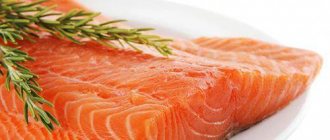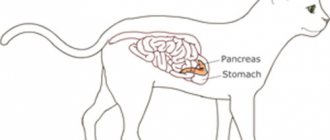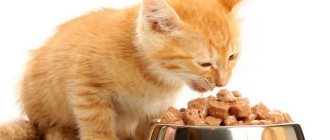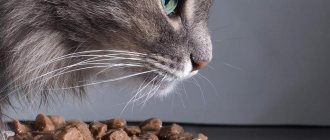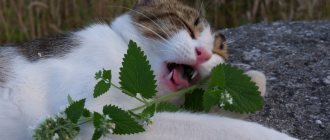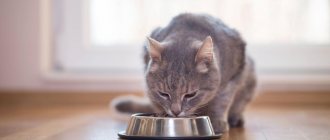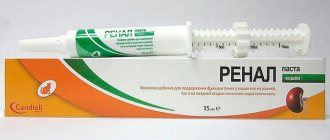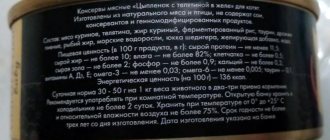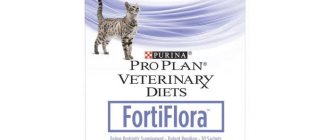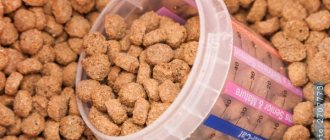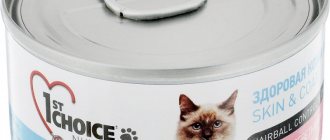What you need to know about liver disease in cats
The role of the liver is that it takes harmful substances from the blood and neutralizes them, removing them through bile. If the functioning of the gland is disrupted, then general intoxication of the body occurs, since toxins remain unresolved, which affects the functioning of all internal organs. Complicated liver pathologies are deadly.
The most common liver diseases in cats are:
- steatohepatosis - a disease accompanied by fatty liver, often occurs due to improper nutrition of the cat - an excess of fats and carbohydrates in the diet;
- hepatitis - inflammation of the liver, usually of viral origin;
- cirrhosis is a disease in which liver cells die and in their place fibrous tissue appears, unable to absorb toxins and excrete them with bile; occurs as a complication of other liver pathologies;
Most often, liver pathologies are hereditary diseases or occur due to poor nutrition, poisoning or complicated infection.
- cholelithiasis - the occurrence of hard stones that block the bile ducts, the causes may be a hereditary metabolic disorder or poor nutrition;
- tumors in the liver - can be benign and malignant, the most dangerous type is hepatocellular carcinoma (rapidly progresses, difficult to treat even in the early stages).
How to tell if your cat has liver disease
Liver diseases can occur due to various reasons, but often the clinical picture is similar. A person should be alert to the following signs:
- frequent vomiting and diarrhea in cats;
- change in color of the mucous membranes of the mouth, whites of the eyes, tongue, ears (acquiring a yellowish tint);
- severe hair loss;
- lack of appetite, sudden weight loss;
- weakness in the cat, apathy;
- dark brown or scarlet color of urine;
- hard and swollen abdomen (upper part);
- signs of pain: the animal moves slowly on bent legs;
- when trying to touch the tummy, he starts screaming, runs away and hides;
If there are signs of deterioration in the cat’s well-being, the animal should be immediately taken to a veterinarian, who will perform a full examination.
Which breeds are most susceptible to liver disease?
There are some breeds, among whose representatives liver pathologies are quite common. First of all, these are animals with a predisposition to metabolic disorders. These include:
- Highland Folds;
- Persian cats;
- Australian mysts;
- Russian blue;
- Siamese;
Siamese cats have a predisposition to metabolic disorders
- Carthusian cats;
- Maine Coons.
In addition to liver problems, these breeds may experience obesity and urolithiasis, as they are also associated with metabolic disorders.
For renal failure and kidney disease
"Purina Veterinary Diets NF Renal Feline"
Dietary food used in the treatment of renal and early stages of heart failure. Among other things, it normalizes blood pressure and can improve the condition of a cat with certain liver diseases. The food is low in protein and phosphorus and should not be fed to animals that require large amounts of these compounds for any reason. It should also not be given to cats during pregnancy or to growing kittens.
Hill's Prescription Diet Feline k/d
The food, which tastes like liver and beef, promotes the elimination of nitrogen-containing metabolic products and phosphorus, which promotes a speedy recovery from various kidney diseases. The food may also be useful in treating heart disease in the early stages.
The preventive effect of the feed is to reduce the risk of formation of urate and cystine uroliths.
Do not give to kittens, pregnant cats, animals suffering from urolithiasis or lack of sodium in the body.
Basic rules of nutrition for liver diseases in cats
Improper nutrition will aggravate liver disease and lead to the rapid death of the cat. To prevent this, you must trust your veterinarian to draw up recommendations for feeding the animal and follow them carefully. In each specific case, these recommendations will differ, since the diet is compiled based on the exact diagnosis, form and stage of the disease, the presence of concomitant diseases, the general well-being of the pet, its age, weight, and breed. Below are just general tips for feeding cats with unhealthy livers.
Nutritional Features
Cat nutrition plays an important role in the prevention of liver diseases and their effective treatment. A suitable diet should be selected together with a veterinarian. In each specific case, nutrition will be individual, as the degree of damage, the pet’s age, weight, and lifestyle are taken into account. However, there are general recommendations.
- The cat's diet should be rich in proteins, which restore damaged liver cells.
- It is important to ensure a complete daily intake of vitamins and minerals into the body - vitamin B (23 IU per 1 kg of animal weight), D (2.3 IU/kg), phosphorus (160 mg), potassium (180 mg), magnesium (25 mg) , zinc (0.15 mg).
- The food must be strictly balanced in fats and carbohydrates. There should be enough of them to provide the animal with energy, but not too much so as not to burden the diseased liver.
- Food containing preservatives and artificial colors is strictly not recommended.
- If the disease worsens, you need to introduce a starvation diet for 1-2 days until you feel better - but only under the supervision of a doctor.
- Feeding rates are being revised towards smaller portions, since overeating and excess weight gain due to liver pathologies worsen the situation. The recommended eating regimen is 4-5 times a day every 2-3 hours.
What ready-made food can I use?
For cats with liver diseases, there are special medicinal foods - their names contain the terms Hepatic or Liver Care. They help slow down the progression of the disease, reduce the load on the organ, and help maintain and restore the functioning of the entire body.
There are also ready-made foods created for cats with liver disease.
What is included in medicinal feed for animals with liver diseases
Food for cats with liver pathologies can be either dry or wet (that is, in the form of pate or meat pieces in jelly). The main condition is that the composition should not contain any preservatives, thickeners, or flavor enhancers. They are always added to economy-class feeds, which are not suitable for sick animals. The Hepatic or Liver Care series are only available in the premium feed category.
The presence of starch and protein hydrolysate in the feed is beneficial in case of chronic liver failure
The nutritional value of medicinal feed should be approximately as follows:
- protein - 15–28%;
- fat - no more than 22%;
- fiber - at least 3%.
Corn gluten, dehydrated poultry or fish, beet pulp, and powdered eggs can be used as a source of protein. Vitamins and minerals are an essential component of medicinal feed. The composition should contain vitamins D3, A, E, B, PP, C, iron, zinc, iodine, selenium, sodium, taurine. Copper should be no more than 4.2 mg (excessive consumption of this mineral puts too much stress on the liver).
Review
The general features of medicinal canned food are that they all have a uniform consistency, contain a sufficient amount of moisture and are very easily absorbed by the cat’s body. It is not necessary to wash down such foods: the amount of liquid in them is such that even if the cat refuses water, it is not in danger of dehydration. The delicate, soft structure of medicinal feed allows a sick animal to eat without any effort. They do not need to be chewed, which is especially important when the cat cannot grab food.
The composition of medicinal feeds is developed by veterinary nutritionists, carefully checking the ratio of the components contained in them. It is very difficult to achieve this quality at home. Yes, this is not necessary: medicinal food is on sale.
What natural foods can you feed a sick cat?
If the owners decide to feed their cat with a diseased liver not with ready-made food, but with “natural” food, then the diet will have to be compiled based on permitted and prohibited foods. Here are some examples of dishes that are suitable for furry patients:
- broth from lean chicken, turkey or fish with cereals;
- boiled and finely chopped poultry and fish (without fascia, tendons, bones and skin), it can be mixed with boiled carrots, beets, pumpkin, potatoes;
- meatballs made from minced chicken or beef and cereals (rice, pearl barley, buckwheat, etc.);
- low-fat milk and sour cream (if the cat tolerates them well).
It is important to ensure that your cat eats well (but does not overeat) and drinks enough water. With liquid, toxins are removed faster through the excretory system, which means that the diseased liver is less stressed, which is very important for recovery and prevention of exacerbations. But there is one caveat: with liver disease, the furry patient does not feel thirsty even with severe dehydration. If the owners notice that their cat practically does not approach the bowl of water, then they will have to forcefully pour it into the animal’s mouth every day (for this you can use a pipette or a syringe without a needle).
The rate of water consumption by a cat per day is 25–30 ml per 1 kg of weight.
For urolithiasis
"Purina Veterinary Diets UR Urinary Feline"
Feed intended for the treatment of urolithiasis resulting from the formation of struvite. The food acidifies the urine, which promotes the rapid dissolution of formations in the bladder. Do not feed growing kittens or cats during pregnancy. Do not use several drugs at the same time that increase the acid content in the urine!
The food contains processed meat, as well as oils, fats, grains, sugar and minerals.
"Hills Prescription Diet Feline s/d"
Used for struvite urolithiasis, feline urological syndrome.
This food is contraindicated for small kittens, pregnant cats, animals with heart and vascular problems, those with other types of urolithiasis, cats with diseased kidneys, hyperkalemia, metabolic acidosis.
The basis of the feed is ground rice grains and turkey and chicken meal.
Is it necessary to add vitamins, microelements and minerals to the diet?
When feeding ready-made food for cats with liver diseases, there is no need to give the animal additional vitamin and mineral complexes, since they are included in biscuits or canned food. With a “natural” diet, it will not be possible to get the required amount of nutrients, especially if the pet is mischievous and does not want to eat vegetables and grass (for example, sprouted oats). In this case, you should ask your veterinarian to select a suitable preparation with vitamins, micro- and macroelements.
It is better not to buy vitamin and mineral complexes yourself without consulting a doctor, as you may choose the wrong product (for a cat with an unhealthy liver, both a deficiency and an excess of micro- and macroelements is harmful)
When gaining weight
"Purina Veterinary Diets OM Obesity Feline"
Special dietary food. Promotes rapid burning of fats in the body and improves metabolism. Can be used in the treatment of diabetes and hyperlipidemia, some types of colitis and trichobezoar. Should not be given to growing kittens and pregnant cats, as well as animals with catabolic disorders. To lose weight, cats weighing 4 kilograms should be given 260 grams of food. The dosage increases by 65 grams per kilogram of animal weight.
"Hill's Prescription Diet Feline w/d"
The food protects sedentary animals from obesity and can help treat diabetes, hyperlipidemia, colitis and constipation. It will protect the cat from the formation of struvite, which in turn can provoke urolithiasis. The food should not be given to kittens, pregnant cats, malnourished or dehydrated animals. You should not give food to cats that are already being treated with other drugs that increase the acidity of urine. Also, before feeding, you should do a blood test to check whether the content of nitrogenous metabolic products of the kidneys is normal. If it is elevated, then the animal should not be given food.
